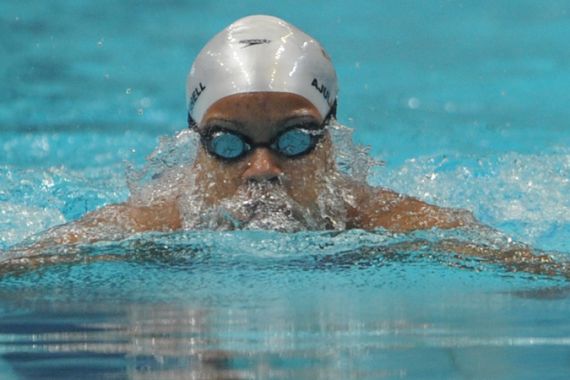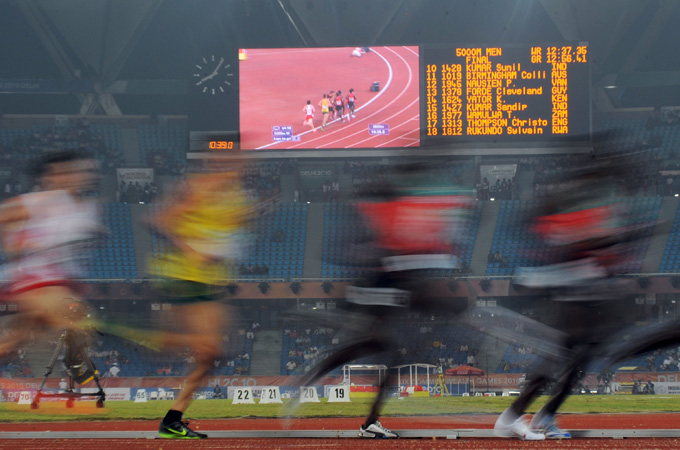Swimmers withdraw from India games
Australian and English doctors want more investigations of a virus that has struck up to 50 swimmers, as two withdraw.

 |
| Uganda’s Moses Kipsiro won the 5000m title, with Kenya’s Eliud Kipchoge second and Kenyan Mark Kiptoo, third [AFP] |
Organisers of India’s Commonwealth Games are facing a new crisis as two Australian swimmers have pulled out of the competition because of health issues.
Up to 50 swimmers are reported to have come down with a stomach virus potentially caused by the suspect quality of water at the aquatics centre in New Delhi, although game organisers say they have only received letters of withdrawal from the two Australians.
Al Jazeera’s Divya Gopalan reported from New Delhi that doctors working for the Australian and English swimming teams are arguing that the fact that so many swimmers have the same kind of stomach bug suggests that they must have picked up the illness in the warm up pool.
Despite assurances from organisers that daily tests of the water have been clear, the English team is seeking more reassurances. They are asking to see the test results and have made complaints about insects and feathers in the pool.
There are concerns that blocked toilets and issues with sewage near the pool might be linked to the suspected contamination, Gopalan reported.
‘Matter of urgency’
Mike Fennell, the head of the Commonwealth Games Federation, pledged to investigate the matter quickly.
He said officials in the Indian capital will conduct tests on both the main pool and the warm up pool at the aquatic complex. But he declined to say whether the swimming events might be cancelled or moved.
| Games at a glance | ||||||||||||
|
“I would not like to speculate about this immediately,” Fennell said. “If there is something unsafe, you cannot swim in that water. It is a matter we have to deal with a great deal of urgency.”
The problems are the latest to plague the Games, which kicked off on October 3 after weeks of controversy over whether India would be able to manage an event of such magnitude.
But on Wednesday, the competition went ahead as planned with England’s Mark Lewis-Francis winning the first heat in the men’s 100-meter field, missing the Commonwealth’s biggest star Usain Bolt.
Uganda’s Moses Ndiema Kipsiro won the first gold medal of the track program, holding off Kenya’s Olympic silver medallist Eliud Kipchoge to finish in 13 minutes, 31.25 seconds.
World record holder Gagan Narang has been on target at the shooting range to help shift some of the spotlight to sports. After helping India claim its first gold of the games on Tuesday, he shot a perfect 600 in qualifying for the 10-meter Air Rifle.
He also set a games record of 103.6 points in the final round to win his second New Delhi gold – at the expense of compatriot and Beijing Olympic champion Abhinav Bindra. That was gold medal number six for India, keeping the hosts in second place on the table.
Indian shooters collected two of the other three gold medals on offer at the range on Wednesday and the host country finished day three of competition with 11 gold medals and 24 medals overall.
Australia dominate
Australia lead the way with 21 gold medals and 46 overall after 53 events. Its cyclists collected the first three gold medals at the velodrome on Wednesday before Malaysia’s Josiah Ng won a dramatic men’s keirin race to end a run of six wins for the Aussies in two days of competition.
Another Malaysian, Azizul Hasni Awang, crossed first in the keirin but was relegated to last place for aggressive riding.
Teenager Megan Dunn produced an upset win over world champion Tara Whitten of Canada to win the women’s points race for Australia, which also won the women’s team sprint and the 40-kilometre points race for men.
The Australian swimmers won six of the nine gold medals in the evening pool program, including both 4×200-meter relays.
Alicia Coutts collected her second gold medal in two days by winning the women’s 100 freestyle, and teammate Leisel Jones led an Australian sweep of the medals in the 200 breaststroke.
Jason Dunford, a US-based swimmer, won Kenya’s first gold of the games in the 50-meter butterfly, holding off returning veteran Geoff Huegill of Australia and former world record holder Roland Schoeman of South Africa.
James Goddard won the 200 backstroke, helping England boost its tally of golds to six and 26 medals overall.
South African Cameron van der Burgh won the 100 breaststroke, and Australia’s Matthew Cowdrey improved his own world record in the Paralympic 50 S9 category, winning in 25.33 seconds.